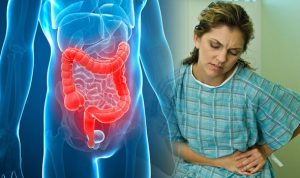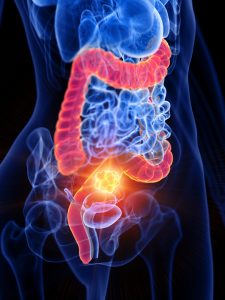Ulcerative colitis is a very common illness in people of all ages. This is an inflammation of the mucous membrane of the rectum or colon, which can lead to the formation of serious pathological.

Various factors can cause ulcerative colitis. Scientists continue to study the causes of this disease, and today they cannot say what is the main cause. Today, doctors and scientists are considering such reasons for the development of pathology as:
- genetic factors;
- lifestyle and bad habits (diet, smoking, taking oral contraceptives);
- severe stress;
- uncontrolled intake of antibiotics;
- decreased immunity.
Unfortunately, this pathology is often asymptomatic in the early stages. And you may not know that you have this disease. But, over time, symptoms appear that indicate that the situation is serious, and you need medical attention. The symptoms of ulcerative colitis appear depending on the stage of development of the pathology. The main ones are:
- diarrhea with a mixture of blood;
- violation of the rhythm of bowel movements or constipation;
- bleeding during bowel movements;
- a sharp loss of body weight;
- abdominal cramps;
- fever and others.
Only a doctor can diagnose ulcerative colitis with a special examination. After you have established this diagnosis, you are prescribed treatment. But apart from medications and treatments, you must follow the correct diet. Certain foods can aggravate your condition and hinder your recovery.

At the same time, your diet should be balanced and contain all the necessary nutrients.
The main indicator of the choice of foods for your diet is your feelings after consuming a particular product. Every patient with ulcerative colitis has different symptoms and responds to a particular product differently. Therefore, your task is to learn to understand your body and listen to its signals. Pay your attention to the reaction of your food to each food you eat throughout the day and exclude those foods that cause you discomfort or pain.
You can keep a food diary and record your reactions to a particular food item. This way you will learn how to make a meal plan based on your needs.
You can eat the food you like without causing any negative symptoms. When you know which foods your body reacts to negatively, you can eat right and even choose the food in restaurants.
You also need to pay attention to the cooking process. Fried food is a lifelong ban on you. But you can steam, bake, or boil. Also, some raw vegetables can worsen your condition.
Considering all these rules and nuances, you can live a full life without pain and stuckness on food. Food should be for you as satiety, not the only way to get pleasure.
During an exacerbation of inflammation and diarrhea, you should reduce your fiber intake to 15 grams per day.
Also, many foods can harm you and increase inflammation in the intestines and rectum. Doctors recommend eliminating caffeinated beverages, alcohol, legumes and beans, nuts, refined sugar, candy, baked goods, sodas, and others from your diet.
But in addition to foods that worsen your condition, there is food that will help you restore your health and promote the renewal of the lining of your intestines.
As we said, your reaction to a particular product is the main signal of the possibility of using it. Also, you need to visit a doctor and work with him/her to develop a diet just for you, which will take into account your food preferences and your body’s response to a particular product.
Many doctors advise eating fermented foods such as low-fat yogurt. Yogurt contains many beneficial bacteria that can help reduce inflammation in your gut.
You also need to eat enough of the right fats, especially omega-3s. Therefore, fish should be on your menu 3-4 times a week. That being said, try to steam or bake it.
Food frequency is important too, so you should eat small meals often. Consider this fact when planning your working day and travel. You should always have food to eat or a healthy snack.
Comments are closed, but trackbacks and pingbacks are open.